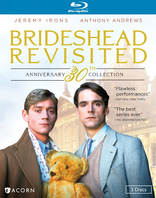Brideshead Revisited Blu-ray Movie
HomeBrideshead Revisited Blu-ray Movie 
30th Anniversary EditionAcorn Media | 1981 | 659 min | Not rated | Nov 01, 2011
Movie rating
7.9 | / 10 |
Blu-ray rating
| Users | 2.0 | |
| Reviewer | 4.0 | |
| Overall | 3.6 |
Overview
Brideshead Revisited (1981)
Two young men meet at Oxford. Charles Ryder, son of a middle class businessman, is befriended by Sebastian Flyte, a member of the noble House of Marchmain, after Sebastian throws up in his college room through an open window. Sebastian then invites Charles to lunch after his teddy bear Aloysius 'refuses to talk to him' unless he is forgiven. Charles becomes involved with Sebastian's family, Catholic peers in Protestant England. The story is told in flashback over twenty years later, as Charles, now an officer in the British Army, is moved with his company to an English country house that he discovers to be Brideshead, Sebastian's family home where Charles remembers happier days.
Starring: Jeremy Irons, Anthony Andrews, Diana Quick, Claire Bloom, John GielgudDirector: Charles Sturridge, Michael Lindsay-Hogg
| Drama | 100% |
Specifications
Video
Video codec: MPEG-4 AVC
Video resolution: 1080p
Aspect ratio: 1.33:1
Original aspect ratio: 1.33:1
Audio
English: Dolby Digital 2.0
256kbps
Subtitles
English SDH
Discs
50GB Blu-ray Disc
Three-disc set (3 BDs)
Packaging
Slipcover in original pressing
Playback
Region A (C untested)
Review
Rating summary
| Movie | 4.5 | |
| Video | 3.5 | |
| Audio | 3.0 | |
| Extras | 4.0 | |
| Overall | 4.0 |
Brideshead Revisited Blu-ray Movie Review
Remembrance of Miniseries Past
Reviewed by Michael Reuben December 5, 2011Brideshead Revisited is a television landmark, but formidable obstacles stand between it and contemporary audiences, just as with Shakespeare's plays (which, let's be honest, are more often respected than enjoyed). Today, TV audiences are accustomed to seeing a complex story unfold over twelve or more hours, with high production values, sophisticated writing and a calibre of acting to rival the motion picture screen. But in 1981, when Brideshead first aired in Britain (debuting shortly after in January 1982 in the U.S.), no one had seen anything like it. The novelty alone drew in viewers, and the quality of the storytelling kept them watching. And in those days, you had no choice but to tune in at the appointed hour, if you wanted to see the program. Consumer VCRs were a pricey novelty item, and affordable home video releases were still several years away. Hard though it may be to imagine now when studios and networks derive vast revenues from home video, at the time of Brideshead, they were spending vast amounts on legal maneuvers to prevent home video from ever getting established. Today there's much more competition for viewers' attention, and Brideshead's style of exposition -- deliberate, detailed, precise; in a word: novelistic -- has fallen out of favor. The ostensible subject matter, life among Britain's privileged upper class in the first half of the 20th Century, still fascinates, as demonstrated by the recent success on both sides of the Atlantic of Julian Fellowes' Downton Abbey. But Downton Abbey moves at a much brisker pace, quickly entangling its viewers in plot developments that Brideshead might take several hours to unfold. Brideshead was made by people who understood that the castles, cocktails and dinners were just "windowdressing" (in director Charles Sturridge's word) for larger themes being explored in the Evelyn Waugh novel they were adapting, and who had the luxury of being sponsored by a TV station (ITV) and production company (Granada) that were sufficiently insulated from competition not to worry about losing viewers' attention. They could take their time telling a story in a way that no one could get away with today (and it seemed risky even then). When the originally planned six hours weren't enough to contain the whole of Waugh's vision, they threw away John Mortimer's script and started shooting the novel. Eventually, the series ran twelve hours, spread over eleven episodes. Technical issues are also a barrier. In the early Eighties, a 28" TV was still considered sizeable, and NTSC (or PAL) was still the norm. The decision to shoot Brideshead entirely on 16mm film was a major step up in quality from standard practice for British TV, which had previously relied almost entirely on videotape. In the following years, 16mm would become standard, until it was replaced by hi-def video, and today it's easy to apply 20-20 hindsight and ask, "What were they thinking?" Seen on today's large screens at Blu-ray's resolution, all the limitations of 16mm are fully on display, and it does not appear that Brideshead has been newly transferred for this edition to get the benefit of the latest equipment and techniques. Still, better resolution is always desirable, as long as you don't expect every Blu-ray to look like the Discovery Channel. And Brideshead retains its potency as a story, as long as you have the patience to discover characters slowly, over a period of years. As Waugh meant to suggest when he included the word "revisited" in the title, Brideshead is a story of memory, of looking back over major events in life and trying to convey their specific density -- and that's not something that can be sketched in broad strokes.
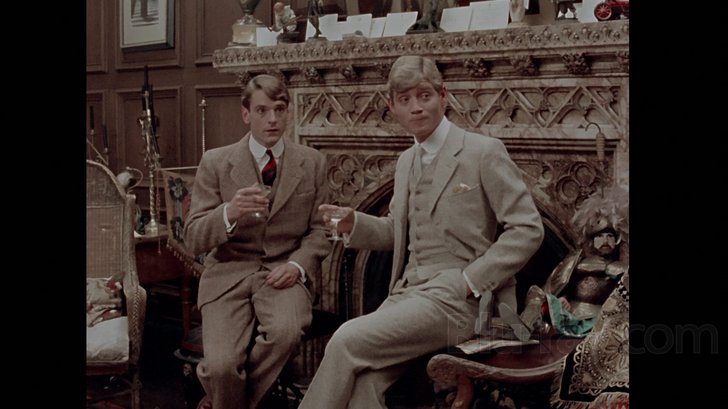
Brideshead Revisited is often described (and usually remembered) as the story of a friendship between two university students who meet at Oxford in 1922: the stolid, middle class Charles Ryder (Jeremy Irons) and the charismatic but eccentric Sebastian Flyte (Anthony Andrews). Sebastian is the second son a of wealthy noble family whose principal estate is the massive country mansion known as Brideshead, and he introduces Charles, an aspiring painter, to a way of life that, to Charles, seems magical and other-worldly. Still, as enchanted as Charles may be by the Flytes' fairy tale existence, he cannot remain blind to the rifts, strains and conflicts within the family, and eventually he too is drawn into them. Whatever illusions Charles may have initially entertained of "riding" along with Sebastian into a transcendent new world of aesthetic indulgence, his fantasies cannot survive the Flyte family's disintegration, which mirrors the decline of Britain and its empire after World War I. The Flyte family name is deliberately ambiguous; are they soaring -- or fleeing? It is central to an understanding of the story that Waugh chose to frame it as a memoir by Charles in 1944, when, as a soldier in the British reserve, he is part of a unit that ends up deployed at Brideshead, now largely deserted and much the worse for wear from its use as a military base of operations. But the estate is full of ghosts for Charles, and thus, from the beginning, we know that, whatever its charms, Brideshead will be a story of paradise lost. Charles and Sebastian famously meet one night when Sebastian is out carousing with friends, while Charles is attempting to pursue academic work with fellow Oxford students in his ground floor residence. Sebastian walks up to the open window, looks as if he's about to speak, then vomits copiously into Charles's sitting room. The next day, Sebastian sends flowers, a note of apology in the name of his teddy bear, Aloysius, and an invitation to lunch. Behavior that would be off-putting and bizarre in most people becomes somehow winning in Sebastian, and a friendship is born. Before long, Charles will shed all his former acquaintances, and he and Sebastian will become inseparable. Despite elements that have led many viewers to see a homoerotic dimension to their relationship, the connection is psychologically deeper, and one of the most intriguing elements of watching Brideshead is studying the nuances of what Charles and Sebastian mean to each other. While the complex relationship between Charles and Sebastian is a central element of Brideshead -- and the performances by Irons and Andrews transformed the careers of both actors -- it is only part of the story. Indeed, Sebastian largely disappears from Brideshead just over halfway through, although his presence remains keenly felt throughout. But every member of the Flyte family fascinates Charles, and every member leaves an indelible impression. In the second episode, Charles and Sebastian travel to Venice, where Charles is introduced to the family patriarch, Lord Marchmain, whom Charles describes as "Byronic" and who is played with incomparable star quality by Laurence Olivier. Lord Marchmain fled the Brideshead estate many years ago, because he found marriage to the religious and rigorously proper Lady Marchmain (Claire Bloom) stifling and unbearable. He won't set foot in England, while his wife remains there, preferring instead a relaxed Italian existence with his mistress, Cara (French film star Stephane Audrane). Sebastian clearly worships his father, just as his older brother, Lord Brideshead, known as "Bridey" (Simon Jones), is devoted to their mother. Charles is utterly star-struck, and Lord Marchmain's brief appearance in episode 2 leaves an afterimage that hovers in the background until the great man himself reappears in the final episode. Lord Marchmain's charisma seems to be genetic, because each of the four junior Flytes holds some special fascination for Charles, even the strait-laced Bridey. As Lord Marchmain observes, Charles seems to have "a penchant for my children". The elder daughter, Julia (Diana Quick), appears briefly at the end of episode 1, when she picks up Charles at the train station to bring him to Brideshead to keep Sebastian company while he recovers from a broken foot. She remains in the background for the next four episodes, often in the company of her beau and future husband, Rex Mottram (Charles Keating), a Canadian emigré and member of Parliament, whose worldly pragmatism makes him both attractive to Julia and, at the same time, wholly incompatible. Then, at the beginning of episode 6, Charles's distinctive voiceover (drawn directly from Waugh's novel) informs us that it's time to talk about Julia. The image fades to sepia, as key events are replayed with new information, and we go forward with new appreciation of Julia's centrality to Charles's life. For Charles, she is, in many ways, the other half of Sebastian.

Brideshead Revisited Blu-ray Movie, Video Quality 
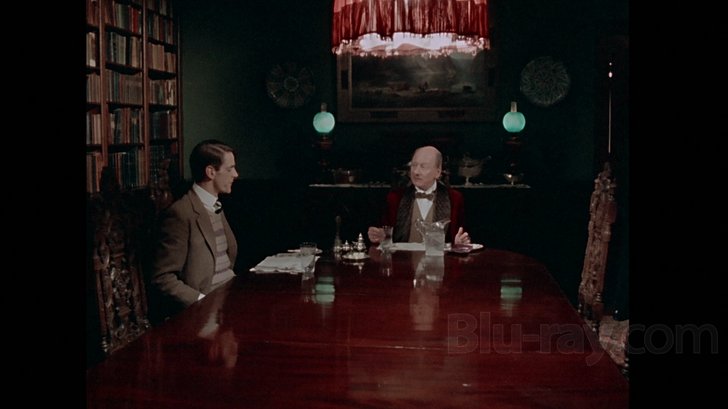
It's not unusual to find that a Blu-ray's specifications vary from those printed on the jacket, but it's rare that they're better. Despite the stated listing of "1080i" on the back cover and slipcase, the actual format of the AVC-encoded presentation is 1080p. I confirmed this (a) on a PS3, (b) with playback software running a PC Blu-ray drive, and (c) by eye while creating screenshots, not one of which required deinterlacing. Otherwise the story is less encouraging. There has been controversy regarding whether this transfer was taken from a film print or the original camera negative (a note at the website for ITV Studios says it's the negative). Regardless, the transfer appears to be the same one used for the 25th anniversary DVD set, and while it may be the best that could have been achieved at the time, one has to question whether it is the best that could be achieved now. The resolution of 16mm may be less than that of 35mm, but the format is capable of producing a remarkably detailed image, as has been demonstrated in, e.g., the first chapter of the recent Red Riding Trilogy. Indeed, on the Blu-ray of Brideshead, individual shots and scenes reveal a level of detail and definition that's a pleasure, but such moments are inevitably surrounded by shots and scenes that are soft and much less distinct. Occasionally a scene will be particularly weak, suggesting a problem with the source (for example, the introduction of Nanny Hawkins in episode 1). The Blu-ray's increase in detail comes at the price of an increase in visible grain and, on top of it, an additional layer of video noise that sometimes intrudes into scenes with complex patterns and sharper contrasts. The good news is that the noise hasn't been reflexively filtered away by DNR, and the grain patterns appear natural and unaffected by digital manipulation (which is not something that can be gleaned from screenshots). Brideshead isn't notable for its strong colors, partly as a result of its production design and partly because so much of it was filmed on location and not within the controlled environment of a soundstage. Still, certain colors come through strongly when necessary, notably the red accents in certain decor and the greens of the countryside, and the Blu-ray conveys these colors with appropriate flair. Black levels range from excellent, especially when reproducing the typical evening wear of the period, to slightly crushed in some night scenes. I have seen it suggested that anyone who is satisfied with their 25th anniversary DVD set needn't bother upgrading to the Blu-ray. I don't have the DVDs for comparison, but I certainly understand the sentiment. Brideshead is a perennial among catalogue titles, and it will almost certainly be reissued again. Assuming the source materials have been well preserved, a fresh transfer using the latest techniques is a reasonable bet.
Brideshead Revisited Blu-ray Movie, Audio Quality 
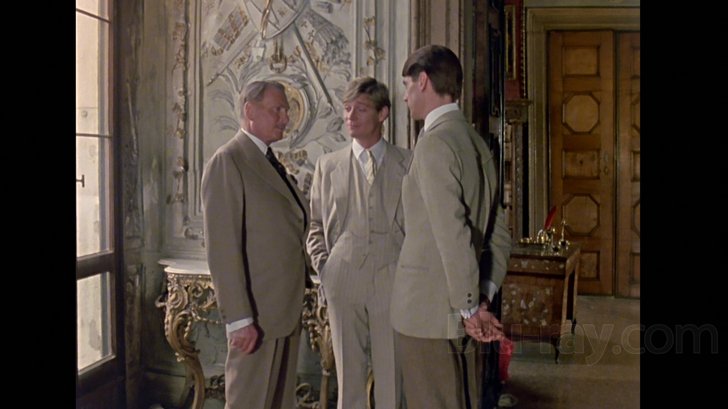
The Dolby Digital 2.0 track, mastered at 256kbps, adequately reproduces Brideshead's original mono soundtrack, of which the two main components are Evelyn Waugh's literate dialogue and voiceover (most of which was taken verbatim from the novel) and the evocative score by Geoffrey Burgon, which became a bestseller on cassette and vinyl (and, when it appeared, a newfangled format called "CD"). Since all of the dialogue is spoken by highly articulate people, everything is exceptionally clear. The track's dynamic range is somewhat limited, perhaps because it was originally created for broadcast, and it's not a good idea to play it loudly, lest the high end of Burgon's score become shrill and fatiguing.
Brideshead Revisited Blu-ray Movie, Special Features and Extras 
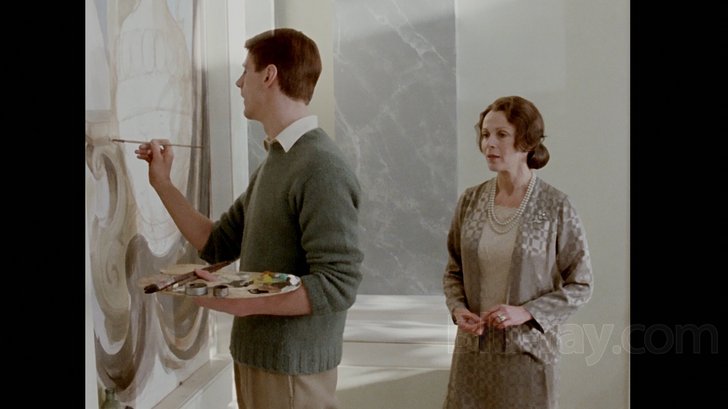
Although I do not have a copy of Acorn's 2006 25th Anniversary DVD edition, my research indicates that this 30th Anniversary set includes substantial new extras. Of particular note are two additional episode commentaries, one by producer Derek Granger on episode 1, and a second by director Charles Sturridge on episode 11; internal references suggest that these were recorded some years earlier but have only now been made available. Also apparently new to this edition is the separate 40-minute commentary, not attached to any specific episode, by original director Michael Lindsay-Hogg.
- Viewer's Guide insert: Bearing a 2006 copyright date, the insert contains a cast list; "The Making of Brideshead" by director Charles Sturridge, dated February 2002; a brief biographical sketch of Evelyn Waugh; episode descriptions; a listing of the production team; broadcast dates; and acknowledgments. A PDF containing the original guide available to PBS subscribers in 1982 is available for download from Acorn Media to purchasers of the Blu-ray set.
-
Disc 1
- Commentary on Episode 1 by Actors Jeremy Irons, Nickolas Grace and Diana Quick: The commentary is moderated by interviewer Robert Ross, who participates more actively on this track than on any other, because none of the three actors are great talkers and Ross's intervention is often required to restart the discussion. Memories have faded, but certain stories emerge: Irons' recollections of working with Gielgud; Grace's being in America on a tour with the Royal Shakespeare Company at the time when Brideshead aired ("so it turned into a Brideshead tour"); Quick's stories of Olivier (on his first day on set, he knew the name of every crew member).
- Commentary on Episode 1 by Producer Derek Granger: Interviewer Ross calls this "part 1" of the episode 1 commentary, although it's listed second, which suggests that it was recorded at about the same time as the commentary with Irons, Grace and Quick. Ross intervenes routinely to prompt Granger with questions, which is essential, because Granger tends to wander and even repeats a story on occasion. It's clear that Granger has told many of these tales about Brideshead before (including on other extras included with this set), but many of them are recounted here in greater depth, including: the circumstances under which Michael Lindsay-Hogg had to leave the production; the negotiations with the producers of The French Lieutenant's Woman over Jeremy Irons' availability; and the discussions with Granada TV and PBS about expanding the series from the original six hours to thirteen. Granger also shares entertaining stories about John Gielgud (not all of them Brideshead-related), whom he'd known for many years.
- Commentary on Episode 4 by Producer Derek Granger and Actor Anthony Andrews: Interviewer Ross introduces the track but says almost nothing thereafter, and Granger lets Andrews do most of the talking. Andrews is clearly delighted to reminisce about the role that, as he says repeatedly, gave him an "international" career (since he already had one in England), and with little prompting he recalls details of how he was hired for the part of Sebastian (having originally thought he was being considered for Charles); of basing the character on former acquaintances with drinking problems; of working with Irons, Bloom and other cast members; of the experience of particular locations and the production's committed atmosphere in general. It's a genial commentary, and when the episode concludes, Andrews says he feels like he's only been talking for a few minutes.
- Photo Gallery (HD; 1.78:1; 3:32). Stills from episodes 1-4.
- Introductory Trailers: At startup, the disc plays trailers, in standard definition, for Acorn Media, the TV series The Queen and Wide Sargasso Sea. These can be skipped with the chapter forward button and are not otherwise available once the disc loads.

-
Disc 2
- Photo Gallery (HD; 1.78:1; 3:02). Stills from episodes 5-8.
-
Disc 3
- Commentary on Episode 11 by Director Charles Sturridge: Sturridge speaks continuously for the episode's 90 minutes, covering much of the same ground as in his "Viewer's Guide" essay, but in substantially greater depth and with more detail and immediacy. An obvious example is his story of first meeting Olivier, which is much more vivid in the telling than the writing. The commentary also adds the detail that Olivier was working on his own autobiography at the time, and Sturridge believes the experience of surveying his own life contributed to the actor's performance as Lord Marchmain. It's also only in the commentary that we get an especially personal aspect of Sturridge's Brideshead experience. He and Phoebe Nicholls, who played Cordelia Flyte, were subsequently married (and remain so) and had three children.
- Revisiting Brideshead (SD; 1.78:1, enhanced; 48:01): This 2006 documentary was created for the series' 25th anniversary and was included on the previous DVD set. It's a typical British production in its inclusion of numerous TV critics and journalists in addition to the cast and crew; the latter include Jeremy Irons, Anthony Andrews, Diana Quick, Nickolas Grace, producer Charles Granger and directors Michael Lindsay-Hogg and Charles Sturridge. The documentary provides a good overview of the series' history and its reception, as well as useful background on the novel's author, Evelyn Waugh (seen in archival footage). However, the scope is too extensive for anything but superficial coverage of any aspect of the subject.
- Brideshead Remembered: Audio Commentary by Director Michael Lindsay-Hogg (HD; 1.78:1; 40:09): The series' original director describes his extensive work in pre-production and directing the initial group of sequences prior to the technicians' strike in the summer of 1979 that shut down production and nearly canceled the series. His commentary is set to a montage of production and publicity stills.
- Outtakes (SD; 1.33:1; 9:48): A few goofs, but many of these are members of the cast and crew pulling pranks on one another, including a pie in the face, dunking star Jeremy Irons in the lake and, to celebrate the production's wrap, mummifying director Sturridge in "silly string".
- Locations Photo Gallery (SD; 1:33:1; 1:47): A small collection of photographs of the cast and crew during filming on location. Unfortunately, these do not fill even the standard-definition frame, which means the resolution is poor.
- Episode 9-11 Photo Gallery (HD; 1.78:1; 2:27): Stills from episodes 1- 9.
- Production Notes: Taken from an interview with production manager Craig McNeil, these notes describe some of the logistical challenges of making Brideshead, including the fact that Jeremy Irons was simultaneously filming The French Lieutenant's Woman and constantly had to be transported between sets.
- Aloysius (SD; 1.33:1; 3:14): A mostly facetious interview with director Charles Sturridge on the "casting" of Sebastian's teddy bear, made for British TV shortly after the series was broadcast. According to a text screen preceding the interview, the bear's original name was "Delicatessen", and, in an early example of controversial transatlantic casting, he was an American.
Brideshead Revisited Blu-ray Movie, Overall Score and Recommendation 

A recent review of this Blu-ray set dismissed Brideshead Revisited as an "Edwardian soap opera", and the phrase is a good example of sacrificing accuracy for a seemingly clever bon mot. The Edwardian era ended in 1910 with the death of Edward VII; Brideshead begins 12 years later, after World War I had shaken the British Empire, redefined the European order and signaled the rise of the United States as the century's dominant power. The elegiac sense of an old order fading out, along with an entire way of life, is the opposite of "Edwardian", but it's essential to Brideshead. As for "soap opera", the term usually connotes over-the-top acting, motivation spelled out in capital letters, bizarre plot twists that make no sense and characters who behave erratically just to create cliffhangers. Brideshead is the opposite on every point: quiet, subtle, logical in its progression, natural in its exploration of character. If that kind of drama interests you, the series is highly recommended. For a first-time buyer, the Blu-ray set is the way to go. If you already have the 2006 DVD set, I suggest studying the screenshots and the list of extras before making your decision.
Similar titles
Similar titles you might also like

At Eternity's Gate
2018

The Servant
1963

A Delicate Balance
1973

Cavalcade
80th Anniversary / Fox Studio Classics
1933

The Master
2012

Wonder Wheel
2017

Mr. Selfridge: The Complete Second Season
Original UK Edition
2013

The Big Parade
Warner Archive Collection
1925

Tunes of Glory
1960

The Other Man
2009

Good Will Hunting
1997

Norma Rae
35th Anniversary Edition
1979

Everlasting Moments
Maria Larssons eviga ögonblick
2008

Sophie's Choice
Collector's Edition
1982

A Dangerous Method
2011

The Club
El Club
2015

Stray Dogs
郊游 / Jiao you
2013

Adore
Perfect Mothers
2013

100 Streets
One Square Mile
2016

Christopher Strong
Warner Archive Collection
1933
